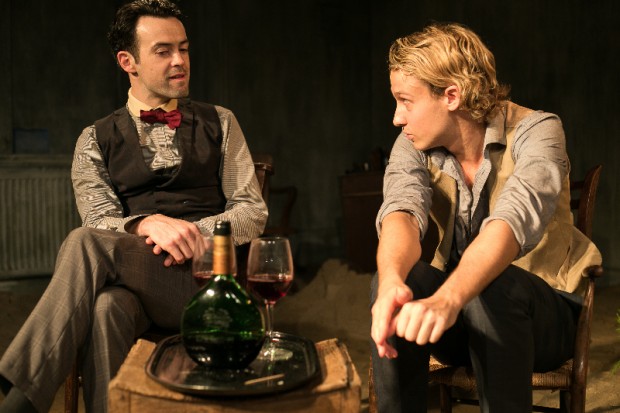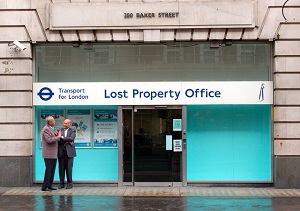You have no items in your cart. Want to get some nice things?
Go shopping
“To burn with desire and keep quiet about it is the greatest punishment we can bring on ourselves.”
― Federico García Lorca, Blood Wedding and Yerma
Nicholas de Jongh’s The Unquiet Grave of García Lorca, now at the Drayton Arms Theatre, is structured around one of contemporary Spain’s best cultural exports, the poet and playwright Federico García Lorca. A key figure in the drive to renovate the Spanish stage during the Second Republic, Lorca’s life and work was infamously cut short by the tragic onset of Spain’s Civil War. The circumstances of his murder have rendered him to become one of the most iconic “martyrs” of the Civil War (1936-1939) and a popular symbol of mass mechanised murder that foreshadowed World War Two.
This play skilfully interweaves multiple strands of the sentimental and the political. As the Civil War looms, the brutal trajectory of history threatens to blight the relationship of Lorca and Juan Ramírez de Lucas. At the centre of the play is a dramatisation of Juan Ramírez de Lucas’s revelation – disclosed shortly before he died in 2010 – that at the age of 19 in 1936 he had been Lorca’s last lover. This opening of Pandora’s Box is echoed through other characters in the play, whose hidden pasts also come to light.
It all begins with the digging up of a grave: an apt symbol for the private digging up of Harry’s past by his grandson Alex, and the public digging up of Britain’s murky stance during the War: a “neutral” non-intervention pact that enabled Hitler and Mussolini to continue to arm Franco in secret. Clearly Jongh has carried out extensive research into this historical moment: in several scenes showing conversations between an MI6 Associate and the Foreign Office, we get a real sense of the shadowy strings that eluded the public at the time.
Everywhere in this play is the bleeding of fact into fiction, past into present. Young and old Juan transcend the constraints of time to ask impossible questions of themselves and Lorca. Many characters are, in a sense, critics, reflecting Jongh’s own biography. There’s the interrogation of Lorca’s historical memory; indeed, as we watch the play, what we see interrogates itself.
The performances work in the play’s favour. Matthew Bentley stands out as the young and serious Juan and Damien Hasson captures the titular playwright’s charismatic vitality. There were some moving scenes between these tragic lovers. In particular, Lorca’s final words to Juan resonated perfectly with the play’s personal-versus-political standpoint: “Count on me always. I am your best friend and I ask you to be political and not allow yourself to be washed along by the river (of fate).”
In other ways, the play falls significantly short. There is a dramatic device incorporating the ghost of Spanish liberalist heroine Mariana Pineda, executed in 1831; Lorca’s own play on her life was staged just ten days before he died. However, this ghostly figure was given such an exaggerated performance from Julia Tarnoky that what had been intended as a stirring unfolding of Lorca’s final moments felt melodramatic and trite. This, combined with the use of Spanish guitar music, had the impression at times of reinforcing facile Spanish cultural stereotypes.
The Unquiet Grave of Garcia Lorca is well-researched and dextrously juxtaposes multiple narratives and characters; there are some very moving narratives and scenes of thwarted lovers whose potential was destroyed by the war. It speaks eloquently, too, of the tragedy of Spain’s Civil War and of Britain’s historical role in it. Nevertheless, I felt as though the audience were placed in the same position as Harry’s ignorant wife as her husband laments: “I wish you understood the Spanish past – dreadful things had to be done.” Character monologues often felt like a didactic retelling of history to an equally ignorant audience. Surely, in any case, the most interesting aspect of Lorca’s “unquiet grave” is his writing? A sense that this rich poetic voice embedded in his theatre and poetry, rather than his sexual orientation and lovers, remains the most revolutionary and lasting legacy of his life. As Lorca says: “Only mystery allows us to live. Only mystery.” This is a play in which Lorca is allowed no mystery.
The Unquiet Grave of García Lorca continues at the Drayton Arms Theatre until October 25. Tickets are £16 (£14 for concessions).

About Charlotte Fereday
Charlotte is a full time final year AHRC funded PhD candidate in the Spanish, Portuguese & Latin American Studies department (SPLAS) at King's College London. Her research focuses on the plays of Spanish writers who went into exile in Latin America following Spain's Civil War. She's also a part time Research Assistant working on a Hispanic theatre in translation project "Out of the Wings" (www.outofthewings.org), a platform that makes the riches of Spanish & Spanish American theatre accessible to English-speaking researchers, theatre professionals & anyone with internet access. See her research biography here: https://kcl.academia.edu/CharlotteFereday




